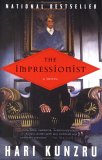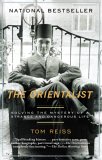Summary | Excerpt | Reading Guide | Reviews | Read-Alikes | Genres & Themes | Author Bio

From Victorian India to Edwardian London this unforgettable novel dazzles with its artistry and wit while it challenges what it means to be Indian or English, black or white, and every degree that lies between them.
Fathered, through circuitous circumstances, by an Englishman, Pran Nath Razdan, the boy who will become the Impressionist, was passed off by his Indian mother as the child of her husband, a wealthy man of high caste. Growing up spoiled in a life of luxury just down river from the Taj Mahal, at fifteen the news of Pran's true parentage is revealed to his father and he is tossed out into the street - a pariah and an outcast. Thus begins an extraordinary, near-mythical journey of a young man who must reinvent himself to survive - not once, but many times. Imprisoned by a brothel and dressed in women's clothes, his sensuous beauty is exploited as he is made to become Rukhsana, a pawn in a game between colony and empire. To a depraved British Major he becomes Clive, an object of desire taught to be a model English schoolboy. Escaping to Bombay he begins a double life as Robert, dutiful foster child to a Scottish missionary couple and as Pretty Bobby, errand boy and sometime pimp to the tawdry women of the city's most notorious district.
But as political unrest begins to stir, Pran finds himself in the company of a doomed young Englishman - an orphan named Jonathan Bridgeman. Having learned quickly that perception is a ready replacement for reality, Pran soon finds himself on a boat bound for Southampton where, with Bridgeman's passport, he will begin again. First in London, then at Oxford, the Impressionist hones his chameleon-like skills, making himself whoever and whatever he needs to be to obtain what he desires.
From Victorian India to Edwardian London, from an expatriate community of black Americans in Paris to a hopeless expedition to study a lost tribe of Africa, Hari Kunzru's unforgettable novel dazzles with its artistry and wit while it challenges with its insights into what it means to be Indian or English, black or white, and every degree that lies between them.

If you liked The Impressionist, try these:

by Tom Reiss
Published 2006
'Mixing memory with desire, this marvelous and original book once more reminds us of ways through which the imagination becomes a refuge from the uncontrollable cruelties of reality.'

by Rohinton Mistry
Published 2003
Mistry evokes laughter and tears as he spins the great wheel of human life and charts the soul's confusion and the body's decline, the endless cycle of repeated mistakes and failures of heart, and, yes, the radiant revelations of love.